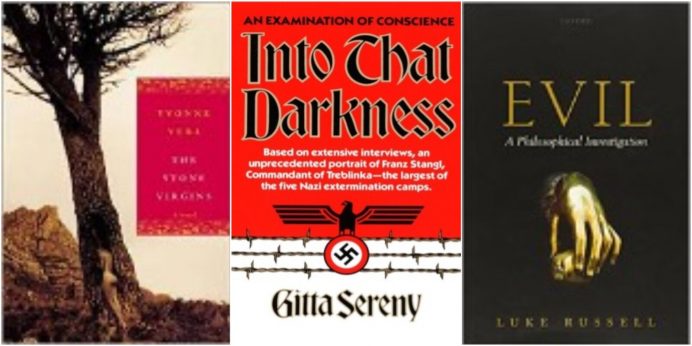Stephen de Wijze is senior lecturer in political philosophy at the University of Manchester and the co-editor with Thomas Nys of The Routledge Handbook on the Philosophy of Evil.
So much has been written on the topic of evil that selecting the best three books is an impossible task. Almost every philosopher of note in both the Western and Eastern traditions has attempted to tackle the question of evil, and every religious doctrine offers an account of what constitutes evil. For example, for all the Abrahamic religious doctrines, the problem of evil focuses on why a good and all-powerful deity would allow evil in the world; what is referred to in the literature as the ‘Theodicy Problem’.
Away from religion, many social scientists have sought to demystify the concept claiming it is based on long discredited metaphysical or religious doctrines. They argue that the concept of evil is not needed at all as part of our moral vocabulary; in fact, it is dangerous, as it is cynically used by politicians and others to illegitimately exclude, demonise, and condemn their enemies. Those working in the natural sciences also reject the term as vague and unhelpful and therefore seek to substitute terms such as ‘empathy deficit’ for ‘evil’ to explain why some persons act in the terrible ways that they do.
Clearly, it is not possible to cover these topics (and the many more) by recommending just three books. With this in mind, I recommend three books that give very different but important insights into our attempt to scrutinize and understand the notion of evil. The first offers a contemporary account of evil persons and acts (Russell) and it illustrates the recent secular philosophical approach at its best. The second is an in-depth examination of the Nazi Franz Stangl’s life and influences; a man who oversaw the Treblinka death camp and bore responsibility for the deaths of nearly a million people (Sereny). Finally, I recommend a recent novel which explores how aimless, sickening, and gratuitous evil affects its victims leaving them broken and scarred for the rest of their lives (Vera). It is my hope that these three different and insightful ways of examining evil will provide crucial insights necessary for obtaining a sophisticated and nuanced understanding of the concept.
Luke Russell – Evil: A Philosophical Investigation
Russell’s book is a paradigm case of what a good philosophical text ought to do when examining a difficult and essentially contested concept. Russell offers a careful, thorough, and closely argued case for the existence of evil actions and evil persons and defends what he calls ‘a restricted pluralist view of evil’. His strategy is to use the method of conceptual analysis which considers a broad range of actual and possible cases of evil to establish necessary and sufficient conditions for the application of the concept of evil. This is not a view taken by many writing on evil, since a historical, metaphysical, or religious lens is often preferred. However, Russell’s approach is deeply attractive to those who seek to understand the notion of evil in its 21st century context, and how it is used by largely secular persons in societies where the previous religious notions are no longer seen as credible.
Russell begins with the observation that when the term evil is used as a description of moral horror and condemnation, it refers to some act or a person’s character that is in some important way normatively different from those standard cases of immoral acts and bad persons. To call someone or an action evil is not just to simply add an intensifier to the view that what we have is something very wrong. Further, it is not merely about the quantity of harm done or the nature of the motivation when acting. Instead, the term ‘evil’ seeks to capture something special, the particular horror and dreadful effects of some actions, and the incomprehensible and terrifying characters of people who behave in this way.
Russell argues for his ‘restricted pluralist’ account of evil actions by subjecting ‘folk’ uses of the concept to rigorous conceptual analysis to reveal the theoretical bases for their claims. These approaches can then be compared and contrasted in order to judge their consistency, coherence, plausibility and efficacy in capturing our moral intuitions about the nature of evil. Russell concludes that there are several plausible conceptions of evil actions, and hence asking if an action is evil is not the right question to pose. Rather, when faced with a possible candidate for evil actions, we ought to ask which of our different conceptions of evil actions is in play. His restricted pluralist account (restricted because it dismisses some conceptions arising from folk intuitions as incoherent) will enable us to properly capture what is unique and disturbing about this aspect of our moral experiences.
Russell also offers us an account of what we mean by an evil person. Again, he begins with seven ‘folk’ intuitions and argues that the most plausible account focuses on a certain kind of fixed disposition to perform evil actions in certain circumstances. Russell’s account of evil persons relies heavily on what he also believes defines evil actions, and hence he is a pluralist about what constitutes an evil person too.
Russell’s book is a complex philosophical text and will appeal more to those with philosophical training. However, he has recently written a shorter and more accessible book (Being Evil, Oxford University Press, 2020) which offers the same arguments in a format accessible to the layperson. For those who want to follow Russell’s approach, this is the place to start before returning to his Evil: A Philosophical Investigation for the more extensive and detailed arguments. In Russell’s work, readers will find clarity, rigour, and a secular approach free of the much discredited metaphysical and religious worldviews. He offers us a clear and persuasive way to think about morally evil acts and persons, despite the recent natural and social scientific attempts to reject the term ‘evil’ as antiquated, unhelpful, and even dangerous. Russell provides a philosophical basis to show why it is still an important moral concept required to accurately describe a terrible part of our moral reality.
Gitta Sereny – Into That Darkness
Sereny’s book takes an entirely different approach in order to understand the notion of evil. She offers an anthropological rather than philosophical analysis by focusing on the actions, beliefs, background and worldview of one very evil man, the Nazi Franz Stangl. Stangl was the Kommandant of the Treblinka extermination camp and sentenced to life imprisonment for his co-responsibility in the murder of 900,000 people. Sereny asks the age-old question of how a human being, with a family, friends, a sophisticated culture, education, and all the basic necessities for a decent life, could willingly and enthusiastically partake in such an overwhelming and incomprehensible evil project. What is more, Sereny chose to try and understand the motives and views of Stangl, in part, because compared to other Nazis on trial he seemed less ‘primitive, more open, serious and sad’ (15). He was a high-ranking Nazi who demonstrated some semblance of conscience over his horrendous actions.
What is so interesting and enlightening about Sereny’s book is that she manages to reveal a considerable amount of the public and private parts of Stangl’s life and delves deeply into his thoughts, relationships, and motivations. He engaged in one of the worst genocides in history yet seemed to have good and ordinary relationships with friends and family that clearly mark him out as intelligent and capable of love, empathy and other characteristics which are commonplace. He did not, as one might expect from his actions, have obvious monstrous qualities. Nevertheless, he still willingly engaged in mass murder, torture, enslavement, ethnic cleansing, and more, while a Nazi Kommandant of a death camp.
Sereny’s careful anthropological examination of Stangl’s life vividly exposes aspects of evil that are not the primary focus of a philosophical analysis. It reveals what Hannah Arendt referred to as the ‘Banality of Evil’ – the everyday bureaucratic functions done by ordinary people when carrying out genocide. Furthermore, her study of Stangl provides the insights into how an evil ideology, such as Nazism, warps and twists the moral landscape. It makes prohibited actions ‘virtuous’ when carried out in the name of an evil ideological view that calls for genocide and the total domination of others. In such a society, those who reject this ideology face enslavement or annihilation. So, reading Into the Darkness provides more than an intellectual understanding of evil – it gives context and depth to this horrendous evil event and shows how a single person can become evil and a willing accomplice in the worst kinds of actions possible. Into the Darkness provokes a feeling of deep disquiet, even dread, since we can see how it is possible for evil to occur and thrive anywhere and at any time if the political, social, and ideological conditions are right.
Yvonne Vera – The Stone Virgins
Russell offers a philosophical analysis of evil, and Sereny examines the background and motives of a quintessential perpetrator of evil. However, with Vera’s The Stone Virgins we turn to a fictitious account of the horrendous effect of evil actions on its victims. The setting of this novel is the newly independent country of Zimbabwe under Robert Mugabe, where a civil war rages between the majority Shona ethnic group and the minority Ndebele in the South of the country. This five-year conflict, which was called the Gukurahundi campaign, resulted in Mugabe’s forces killing, by some estimates, as many as 80,000 people, and torturing thousands more. Vera’s fictional account of the lives of two women living in this civil war seeks to capture the unique kind of life-wreaking trauma and suffering that mindless evil inflicts on its victims.
The central character of the novel, Nonceba, is subject to unspeakable and pointless violence and cruelty. A sadistic ex-guerrilla, called Sibaso, who revels in his brutality and mindless violence, rapes and mutilates her, after beheading her beloved sister, Thenjiwe. Sibaso’s evil actions have no political or security purpose, nor do they arise from the motive of revenge. His conduct emanates from deep within his sadistic core where the mindless, incomprehensible and pointless violence is done for its own sake. While it is hard to understand the mind of a sadist like Sibaso, it is all too easy to viscerally feel and empathise with the devastating effect of his unspeakable evil on Nonceba. His infliction of cruelty and mindless brutality, done with patience and determination, has a devastating effect. The causing of unbearable pain, both physical and psychological, the humiliation of rape and mutilation, the senseless murder of a loved one, destroys Nonceba dignity, purpose, and ability to ever again feel at home and contented in the world. Even though she survives the horrific physical assault, she remains psychologically and emotionally crippled. Mindless evil alters and wreaks lives, it cannot be undone or compensated for, and is qualitatively different to other forms of wrongdoing where we understand its purpose, motives, and limits. Evil actions extinguish reason, hope, justice, and love. They shatter lives irredeemably and leave victims crushed and devastated with ruined and wretched lives.
Vera’s novel draws on and strikingly articulates the well-documented effects of those who suffered from and survived the worst kinds of evil actions. We know that the victims of genocide, torture, and rape, never fully recover. We also know that evil leaves a residue of moral pollution for the perpetrator and deep shame for the victim, which is never washed away. Our horror and visceral disgust in the face of evil actions and persons is a testimony to this. Vera’s novel is a masterpiece at expressing this facet of the concept.
Honourable Mentions
Claudia Card – The Atrocity Paradigm
Card’s 2002 book is widely praised as a model account of a secular account of evil. She argues that evil actions are those which have a reasonably foreseeable intolerable harm coupled to culpable wrongdoing.
Andrew Delbanco – The Death of Satan: How Americans Have Lost the Sense of Evil
Delbanco rejects the attempt by contemporary social science to dismiss the notion of evil as primitive and unnecessary. He argues that the notion of evil continues to be a concept which remains a necessary part of our moral vocabulary.
Philip Cole – The Myth of Evil
Cole’s book seeks to show why the very concept of evil is empty, unnecessary and dangerous. It stands as a sceptic’s criticism of all accounts of evil.
Thomas Nys and Stephen de Wijze – The Routledge Handbook of the Philosophy of Evil
This collection of essays offers historical accounts of evil from Plato to Camus along with the recent secular debates concerning evil acts and persons.
Peter Brian Barry – Evil and Moral Psychology
Barry’s book focuses on what it is to be an evil person (rather than evil actions) and melds ethics and psychology to offer a detailed analysis of the evil character.




































